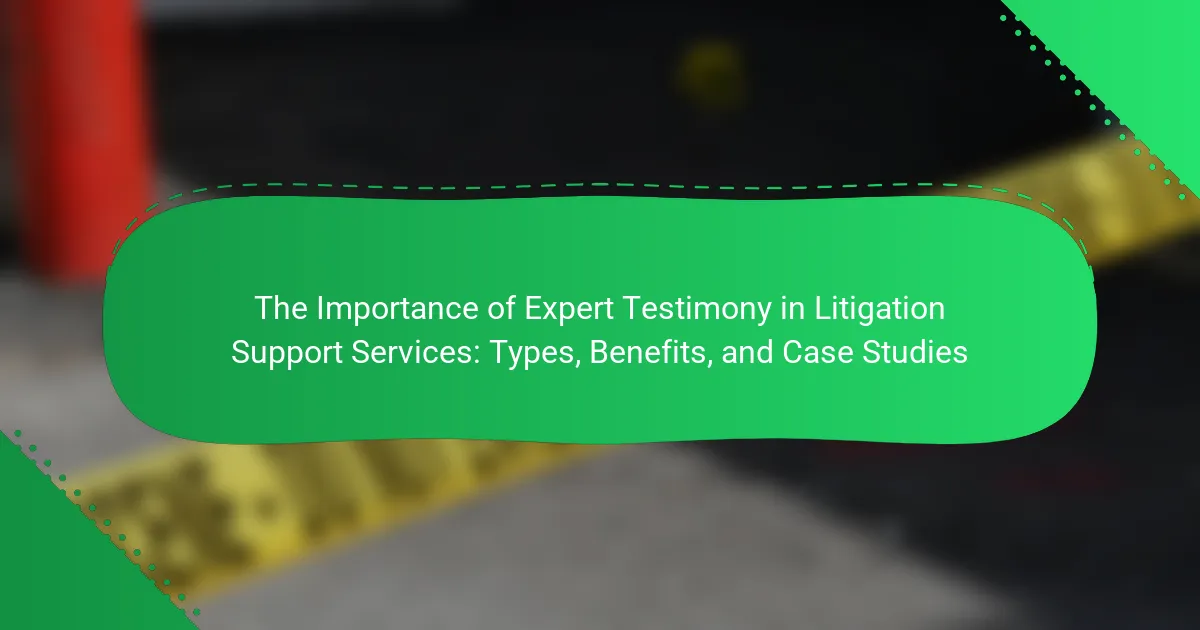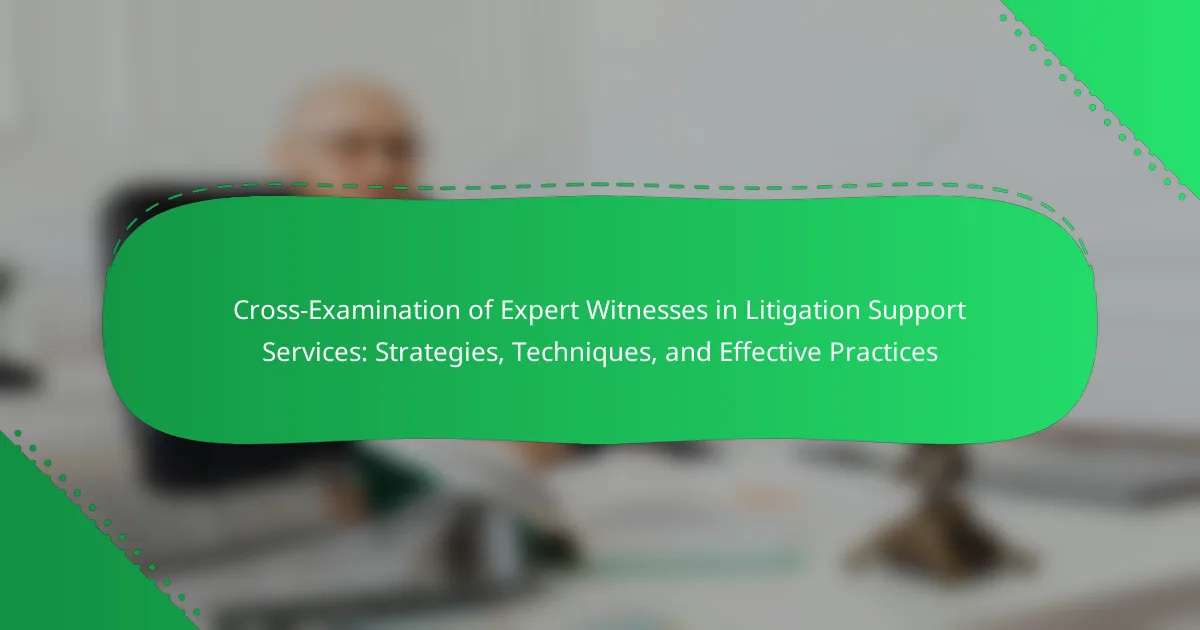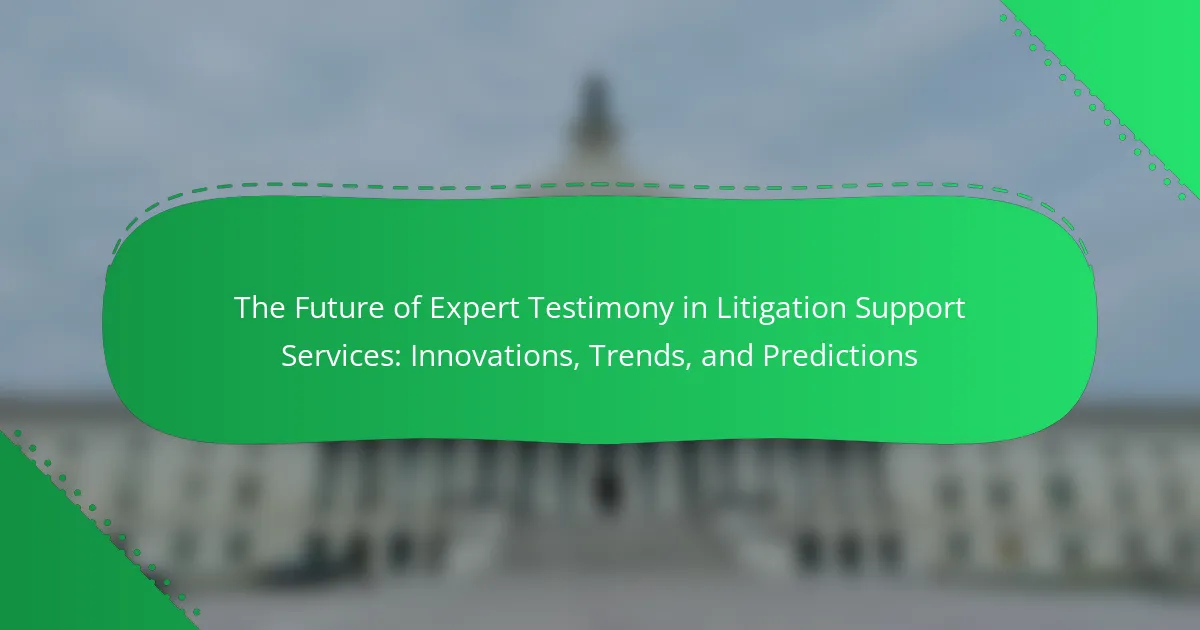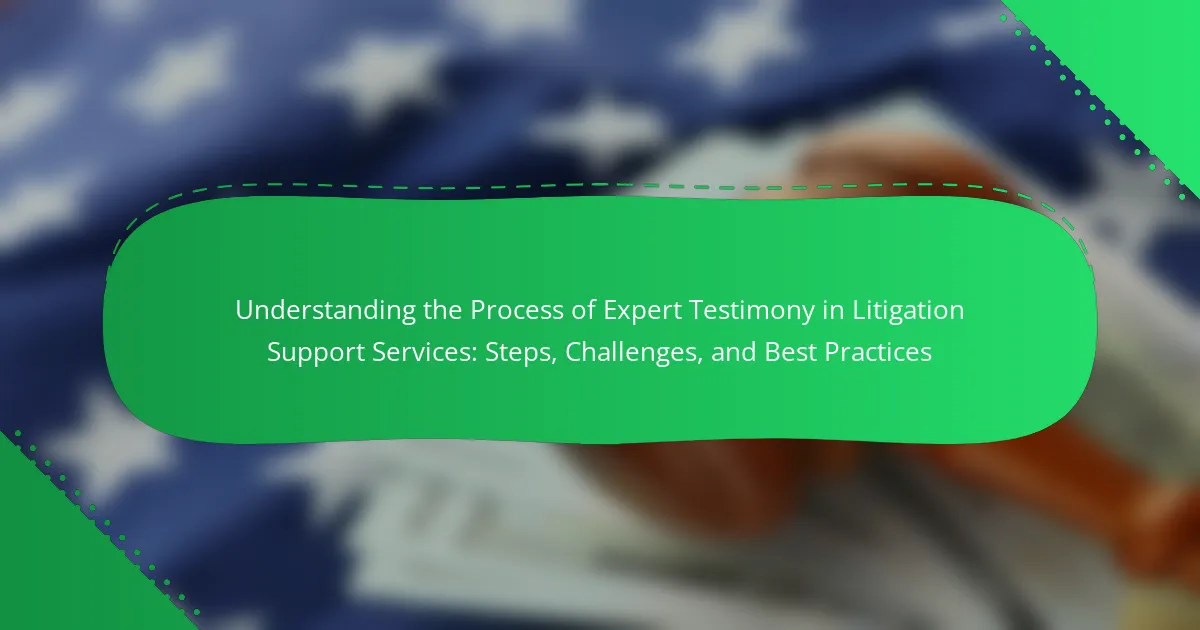Expert testimony is a critical component of litigation support services, providing specialized knowledge that aids legal decision-making. This article examines the various types of expert testimony, including factual, opinion, demonstrative, and expert reports, each serving distinct functions in court. The benefits of expert testimony are highlighted, showcasing its role in enhancing case credibility, clarifying complex issues, and influencing trial outcomes. Notable case studies, such as Liebeck v. McDonald’s and Daubert v. Merrell Dow Pharmaceuticals, illustrate the significant impact of expert witnesses on legal proceedings and the establishment of standards for admissibility of expert evidence.
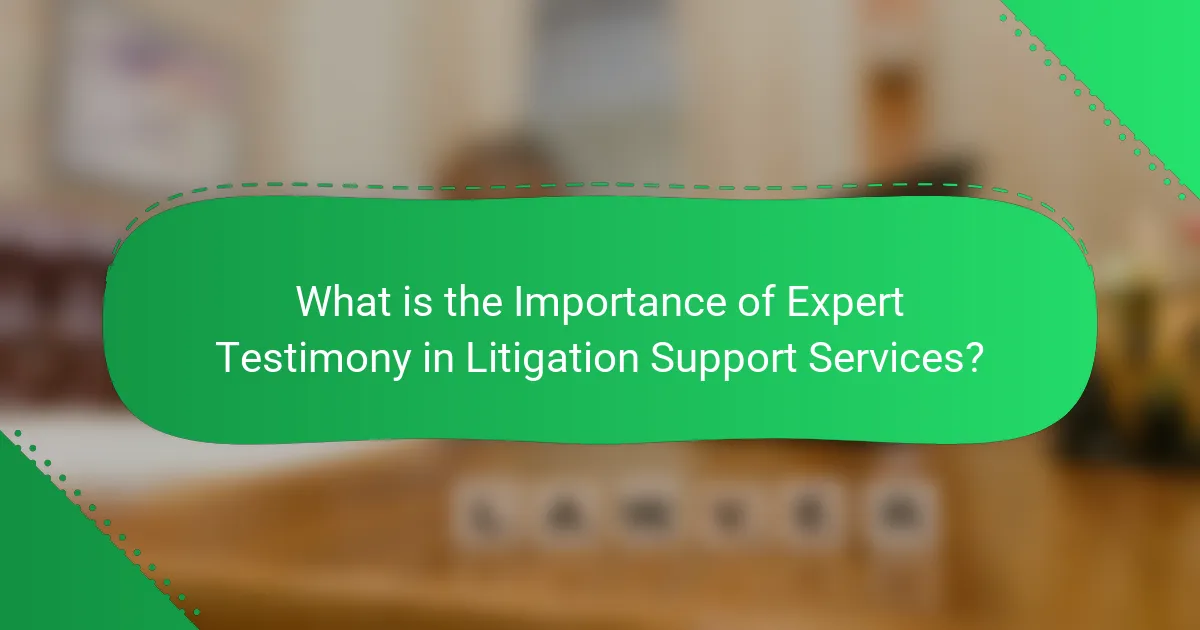
What is the Importance of Expert Testimony in Litigation Support Services?
Expert testimony is crucial in litigation support services as it provides specialized knowledge to inform legal decisions. Experts help clarify complex issues that may be beyond the understanding of a judge or jury. Their insights can significantly influence the outcome of a case. For instance, expert witnesses can present data, analyze evidence, and offer professional opinions that bolster a party’s argument. According to a study by the National Center for State Courts, cases with expert testimony are more likely to result in favorable outcomes for the party that presents it. This underscores the vital role experts play in enhancing the credibility of evidence presented in court.
How does expert testimony function within the context of litigation support?
Expert testimony functions as a specialized opinion provided by an individual with expertise in a relevant field during litigation. This testimony assists the court in understanding complex technical or scientific issues. Experts evaluate evidence, offer insights, and clarify matters that are beyond the average person’s comprehension. Their objective analysis can influence case outcomes significantly. According to the Federal Rules of Evidence, expert testimony must be based on sufficient facts or data and reliable principles. Courts often rely on expert opinions to validate claims and establish credibility. This reliance underscores the importance of expert testimony in ensuring fair and informed legal proceedings.
What roles do expert witnesses play in legal proceedings?
Expert witnesses provide specialized knowledge in legal proceedings. They help clarify complex subjects for judges and juries. Their testimony can influence case outcomes significantly. Expert witnesses may also assist in case preparation by offering insights on evidence. They often prepare reports summarizing their findings. These reports serve as critical documents in litigation. Furthermore, expert witnesses may be involved in depositions. Their presence can enhance the credibility of the presented evidence. Overall, they play a vital role in ensuring informed decision-making in court.
How is expert testimony presented in court?
Expert testimony is presented in court through a structured process. First, the expert witness is qualified by the judge. This qualification assesses the expert’s education, experience, and expertise in the relevant field. Next, the expert provides their opinion based on facts or data presented during the trial. This opinion must be relevant to the case at hand. The expert may present findings through written reports or live testimony. During live testimony, the expert answers questions from both the attorney and the opposing counsel. The expert’s credibility is often evaluated based on their qualifications and the clarity of their explanations. Courts may rely on expert testimony to clarify complex subjects for the jury.
Why is expert testimony critical for legal cases?
Expert testimony is critical for legal cases because it provides specialized knowledge that informs legal decisions. Legal cases often involve complex subjects that require expert interpretation. Experts clarify technical details, making them accessible to judges and juries. Their insights can significantly influence the outcome of a case. Research shows that cases with expert testimony are more likely to be resolved favorably for the presenting party. This is particularly true in fields like medicine, engineering, and finance, where expert opinions are essential. The credibility of expert witnesses can also enhance the overall persuasiveness of a case.
What advantages does expert testimony provide to attorneys?
Expert testimony provides attorneys with credibility and specialized knowledge. This enhances the persuasiveness of their arguments in court. Expert witnesses can clarify complex topics for judges and juries. They help establish the standard of care in professional negligence cases. Their insights can influence the outcome of litigation significantly. Studies show that cases with expert testimony are more likely to result in favorable verdicts. Additionally, expert witnesses can assist in preparing legal strategies. Their involvement often leads to more thorough case evaluations.
How does expert testimony influence jury decisions?
Expert testimony significantly influences jury decisions by providing specialized knowledge that aids in understanding complex evidence. Jurors often rely on expert opinions to clarify technical aspects of a case. This guidance helps jurors make informed decisions based on credible information. Research indicates that jurors are more likely to follow the recommendations of experts. For instance, a study published in the Journal of Empirical Legal Studies found that jurors exposed to expert testimony were more likely to reach verdicts consistent with the expert’s conclusions. Thus, the credibility and clarity of expert testimony can sway jury perceptions and outcomes.
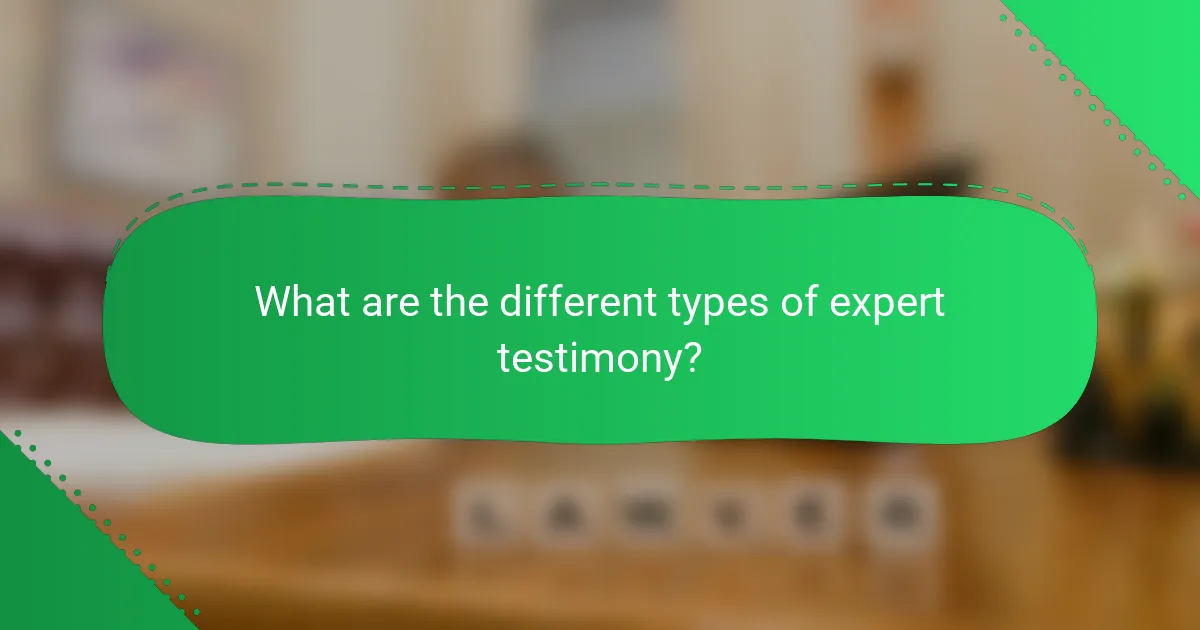
What are the different types of expert testimony?
There are several types of expert testimony. These include factual testimony, which presents objective information based on facts. Opinion testimony offers subjective insights from an expert’s professional judgment. Demonstrative testimony uses visual aids to clarify complex information. Finally, expert reports provide comprehensive analysis and conclusions based on evidence. Each type serves a unique purpose in litigation, enhancing understanding and supporting arguments.
How are expert witnesses categorized based on their expertise?
Expert witnesses are categorized based on their expertise into three main types: scientific, technical, and specialized. Scientific expert witnesses provide knowledge in fields like medicine, biology, or chemistry. Technical expert witnesses focus on areas such as engineering, software, or manufacturing processes. Specialized expert witnesses possess unique knowledge relevant to specific industries, such as finance or art valuation. This categorization helps courts determine the appropriate expertise needed for a case. Each type of expert witness plays a crucial role in providing clarity and support in litigation. Their specialized knowledge assists in understanding complex issues that may arise during legal proceedings.
What distinguishes a fact witness from an expert witness?
A fact witness provides testimony based on their direct observations or experiences related to a case. This type of witness recounts events they have personally witnessed. In contrast, an expert witness offers specialized knowledge or opinions based on their expertise in a particular field. Expert witnesses analyze evidence and provide insights that help clarify complex issues for the court. The distinction lies in the nature of their testimony; fact witnesses share factual accounts, while expert witnesses interpret and explain those facts through their professional lens. This differentiation is crucial in legal proceedings, as it impacts how evidence is presented and understood.
What are the various fields of expertise represented in expert testimony?
Expert testimony is represented by various fields of expertise. Common fields include medicine, engineering, psychology, and finance. Each field provides specialized knowledge relevant to specific cases. For instance, medical experts assess injuries or health conditions. Engineers may analyze structural failures or design flaws. Psychologists can evaluate mental health issues in legal contexts. Financial experts often assess economic damages or fraud. These experts offer credible insights based on their training and experience. Their testimony can significantly influence court decisions and outcomes.
What are the common forms of expert testimony?
Common forms of expert testimony include oral testimony, written reports, and deposition testimony. Oral testimony occurs when an expert presents their findings in person during a trial or hearing. Written reports provide detailed analysis and conclusions in a documented format. Deposition testimony involves an expert answering questions under oath before a trial, typically during the discovery phase. Each form serves to convey specialized knowledge to support legal arguments. These methods enhance the credibility of evidence presented in court.
How do written reports differ from oral testimony?
Written reports present information in a structured, documented format, while oral testimony involves spoken communication in a live setting. Written reports allow for thorough analysis and detailed evidence, often including citations and references. They can be reviewed multiple times by various stakeholders. In contrast, oral testimony is immediate and interactive, allowing for real-time questioning and clarification. Written reports may lack the personal engagement found in oral testimony. Oral testimony can convey tone and emotion, which may influence perception. Each serves distinct purposes in legal contexts, emphasizing clarity in written forms and immediacy in spoken forms.
What is the significance of demonstrative evidence in expert testimony?
Demonstrative evidence in expert testimony serves to clarify complex information for the court. It enhances understanding by providing visual aids, such as charts or models. This type of evidence can simplify intricate concepts, making them accessible to jurors. It also reinforces the credibility of the expert’s testimony. Studies show that jurors are more likely to retain information presented visually. Demonstrative evidence can effectively illustrate key points, helping to persuade the jury. Overall, it plays a crucial role in facilitating comprehension and influencing decisions in legal proceedings.
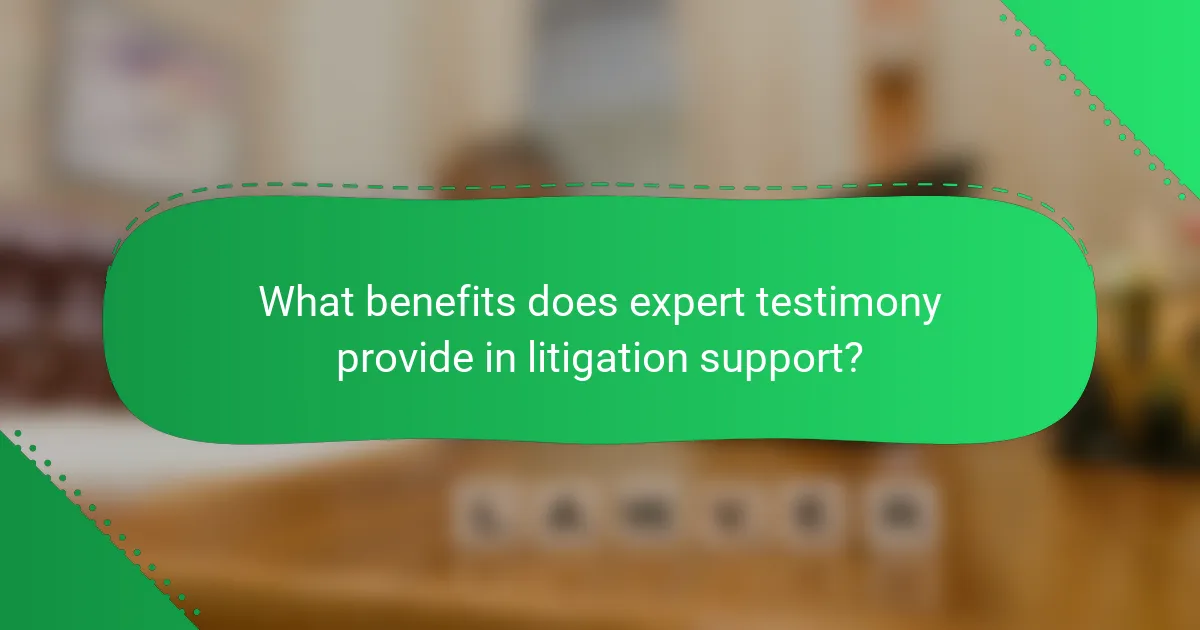
What benefits does expert testimony provide in litigation support?
Expert testimony provides critical advantages in litigation support. It enhances the credibility of a case. Expert witnesses offer specialized knowledge that can clarify complex issues. Their insights can help juries understand technical details. This understanding can influence the outcome of a trial. Moreover, expert testimony can assist in establishing a standard of care in professional negligence cases. It often serves to validate the claims made by attorneys. The presence of an expert can also facilitate settlement negotiations. Research shows that cases with expert testimony have higher success rates in court.
How does expert testimony enhance the credibility of a case?
Expert testimony enhances the credibility of a case by providing specialized knowledge and insights. This expertise helps clarify complex issues for the judge and jury. Experts can present evidence that is scientifically valid and relevant. Their qualifications and experience lend authority to the information shared. Courts often rely on expert testimony to establish standards and norms within a specific field. The presence of an expert can significantly influence the perception of the case’s validity. Studies show that cases with expert testimony are more likely to result in favorable outcomes. For example, a report by the National Center for State Courts indicates that expert witnesses can increase the likelihood of winning a case by up to 50%.
What impact does expert testimony have on settlement negotiations?
Expert testimony significantly influences settlement negotiations by providing credible, specialized insights. This testimony helps clarify complex issues, making them more understandable for all parties involved. It can bolster a party’s position, leading to increased leverage during negotiations. For instance, expert opinions can validate claims or defenses, which may prompt the opposing party to reconsider their stance. Additionally, the presence of a reputable expert can enhance the perceived strength of a case. Research indicates that cases supported by expert testimony are more likely to settle favorably before trial. This is because the expert’s analysis can highlight the risks of litigation, encouraging a settlement. Overall, expert testimony serves as a critical tool in shaping the negotiation landscape.
How can expert testimony assist in complex cases?
Expert testimony can assist in complex cases by providing specialized knowledge that informs legal arguments. Experts clarify intricate topics that laypersons may not understand. They help to establish facts through credible analysis. Their insights can influence the judge’s or jury’s perception of evidence. For instance, in medical malpractice cases, a physician’s testimony can explain standard practices. In financial disputes, an accountant can elucidate complex financial data. Studies show that cases with expert testimony have higher success rates. This underscores the value of expert insights in legal proceedings.
What are the potential challenges associated with expert testimony?
Potential challenges associated with expert testimony include bias, credibility issues, and complexity. Bias occurs when an expert has a personal interest in the case outcome. This can affect the objectivity of their testimony. Credibility issues arise if the expert lacks relevant qualifications or experience. Courts may question the reliability of their opinions. Complexity presents a challenge when expert testimony is difficult for juries to understand. This can lead to confusion and misinterpretation of critical information. Additionally, opposing counsel may effectively challenge the expert’s findings, undermining their impact. These challenges can ultimately influence the effectiveness of expert testimony in litigation.
How can biases affect the reliability of expert testimony?
Biases can significantly undermine the reliability of expert testimony. They can lead experts to favor specific outcomes based on personal beliefs or experiences. This favoritism can distort the interpretation of evidence. For instance, confirmation bias may cause an expert to prioritize information that supports their viewpoint while ignoring contradictory data. Additionally, biases can result from affiliations with particular organizations or stakeholders. Such conflicts of interest may compromise objectivity. Studies show that biased testimony can mislead juries and affect case outcomes. Therefore, recognizing and mitigating biases is crucial for maintaining the integrity of expert testimony.
What steps can be taken to mitigate challenges related to expert witnesses?
To mitigate challenges related to expert witnesses, thorough vetting is essential. This includes verifying qualifications and experience in the relevant field. Clear communication of expectations between attorneys and experts helps prevent misunderstandings. Providing experts with case-specific information ensures they can offer relevant insights. Preparing experts for courtroom testimony through mock trials can enhance their effectiveness. Additionally, maintaining a collaborative relationship fosters trust and reduces potential conflicts. Utilizing technology for remote consultations can also address logistical challenges. Engaging multiple experts can provide diverse perspectives and strengthen the case.
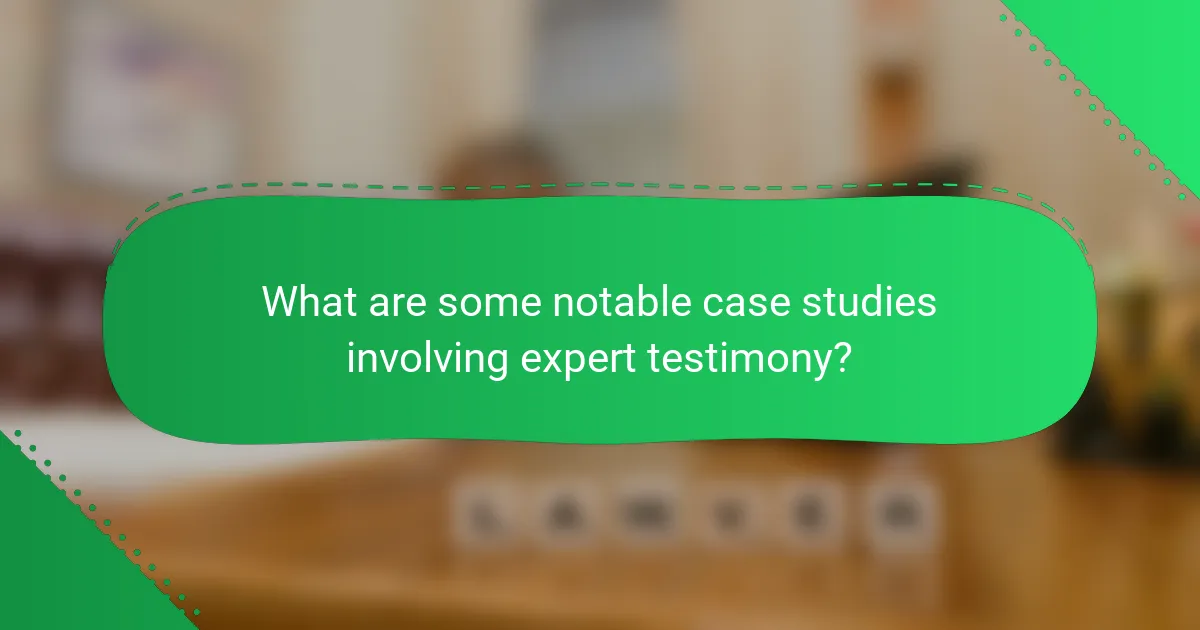
What are some notable case studies involving expert testimony?
Notable case studies involving expert testimony include the McDonald’s hot coffee case, Liebeck v. McDonald’s Restaurants. In this case, expert testimony was used to establish the severity of burns caused by the coffee. Another significant case is Daubert v. Merrell Dow Pharmaceuticals, where expert testimony was evaluated for scientific reliability. The case set standards for admissibility of expert evidence in federal courts. Additionally, in the case of Kumho Tire Co. v. Carmichael, expert testimony was critical in assessing tire failure. These cases illustrate the pivotal role of expert testimony in influencing legal outcomes.
How have landmark cases utilized expert testimony effectively?
Landmark cases have utilized expert testimony effectively by providing specialized knowledge that informs legal decisions. Expert witnesses clarify complex subjects for judges and juries. They help establish facts that are critical to the case outcome. For instance, in the case of Daubert v. Merrell Dow Pharmaceuticals, the Supreme Court set standards for admissibility of expert testimony. This case emphasized the need for scientific validity in expert opinions. Similarly, in Kumho Tire Co. v. Carmichael, the Court ruled that expert testimony must be relevant and reliable. These cases illustrate how expert testimony shapes legal standards and influences verdicts.
What lessons can be learned from successful expert testimony in high-profile cases?
Successful expert testimony in high-profile cases demonstrates the importance of clarity and credibility. Experts must present complex information in an understandable manner. This enhances jurors’ comprehension and retention of key facts. Additionally, experts must establish their qualifications and experience. Their credibility influences the weight of their testimony. Engaging storytelling can also make expert insights more relatable. This technique helps to connect with the jury on an emotional level. Furthermore, preparation is crucial for anticipating cross-examination challenges. Experts should rehearse their responses to potential questions. Effective communication strategies are essential for successful testimony. These lessons are evident in cases like the O.J. Simpson trial, where expert testimonies significantly impacted the jury’s decisions.
What practical tips can be applied when seeking expert testimony?
Identify the specific area of expertise needed for the case. This ensures the expert’s qualifications align with the case requirements. Research potential experts through professional networks and academic institutions. Review their credentials, publications, and previous testimonies. Contact the selected expert to discuss the case details. Clearly outline the expectations and the scope of their testimony. Assess their communication skills during initial discussions. Ensure the expert is available and willing to commit time for the case. Document all communications and agreements for future reference.
How should attorneys select the right expert witness for their case?
Attorneys should select the right expert witness by evaluating their qualifications, experience, and relevance to the case. They need to ensure the expert has specialized knowledge in the area pertinent to the case. Reviewing the expert’s past testimony and publications can provide insights into their credibility.
Attorneys should also assess the expert’s ability to communicate complex information clearly. This is crucial for effective testimony in court. Additionally, considering the expert’s availability and willingness to work with the legal team is essential.
Finally, attorneys should conduct interviews to gauge how well the expert aligns with the case strategy. This comprehensive approach enhances the likelihood of a successful outcome in litigation.
What are best practices for preparing an expert witness for trial?
Best practices for preparing an expert witness for trial include thorough training and familiarization with case details. The expert should understand the legal context and the specific questions they will address. Mock trials can help the witness practice their testimony under pressure. Clear communication with legal counsel is essential to align on strategy and expectations. The expert must also be prepared to explain complex concepts in layman’s terms. Reviewing relevant case law and previous testimonies can provide valuable insights. Finally, ensuring the expert’s credibility through proper qualifications and experience is critical for their effectiveness in court.
Expert testimony is a critical component of litigation support services, providing specialized knowledge that informs legal decisions and clarifies complex issues for judges and juries. The article explores the various types of expert testimony, including factual, opinion, and demonstrative testimony, and highlights the benefits they offer in enhancing case credibility and influencing outcomes. It also addresses the roles of expert witnesses, the process of presenting testimony in court, and the significant impact expert insights can have on settlement negotiations and jury decisions. Notable case studies are examined to illustrate the effective use of expert testimony in shaping legal standards and influencing verdicts.
